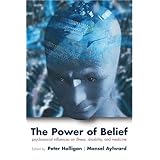
Average Reviews:

(More customer reviews)The notion that beliefs can have powerful effects on our lives is thousands of years old, but is re-appearing in a new setting. Not as some New Age idea, but as a key to health and healing.
The beliefs that we have about our health are central to the way that we understand, behave and respond to medical treatment. From teaching thousands of health care professionals and members of the public around the globe, it is striking that virtually all of them have become wedded to the notion that an illness or a problem must have a single cause. The idea has been repeated in a thousand television programs, books and articles. Yet it is almost always wrong. Rarely is there just one cause for any problem. It's very interesting to hear people describe something like back pain, a headache or a marital problem. As they describe the problem they will constantly insert their beliefs about what caused it.
Many doctors become very frustrated if they are told that most medical problems cannot be reduced to a single biochemical cause. Most have been trained to believe that behind every human malady lies a faulty gene or a metabolic process deranged by intemperate behavior. But there's more to illness than that: we have to consider the psychological and social aspects of the problem, and even its meaning and purpose.
This is one of the very best books on these topics that I have read in a long time. It is a collection of essays, primarily from researchers in the United Kingdom. For a multi-authored book, the writing is remarkably uniform and there is little overlap.
The Introduction begins with two essays entitled: "Beliefs: shaping experience and understanding illness." And "Beliefs: Clinical and vocational interventions; tackling psychological determinants of illness and disability."
Part 1: "Conceptual and Psychological Perspectives," has chapters on:
The cognitive neuroscience of belief
Biased beliefs and the subjective validation effect
The cognitive anthropology of belief
Placebo: the role of expectancies in the generation and alleviation of illness
Volition and psychosocial factors in illness behavior
Belief in rehabilitation, the hidden power for change.
Part 2: "Clinical and Occupational Perspectives," includes chapters on:
Pubic and medical beliefs about mental disorders and their treatment
Beliefs and adherence to treatment: the challenge for research and clinical practice
Explaining unexplained symptoms: the role of beliefs in clinical management
Beliefs and obstacles to recovery in low back pain
Managing disability by public policy initiatives
Clinician bias in diagnosis and treatment
As you can see, the book covers a lot of ground in just over 200 pages, and every article is well referenced.
This is an important book that I hope will have an impact on clinical practice, research and policy. Though designed for clinicians, it is a book that has much that would be of interest to anyone concerned about health, wellness and recovery from illness.
Highly recommended.
Click Here to see more reviews about: The Power of Belief: Psychological Influence on Illness, Disability, and Medicine
Over the past two decades, a widening gulf has emerged between illness presentation and the adequacy of traditional biomedical explanations. As a result, the causes of many illnesses remain a mystery for both patient and physician, with the consequence that increasing numbers of well-educated people are using alternative or complementary medicines. In an attempt to bridge this gap between illness and explanation, without sacrificing the clear benefits of the biomedical approach, many health care professionals have begun to consider a biophysiological approach. Central to this approach is the belief that disease and illness are not just the result of pathophysiological causes but involve and can be explained in terms of psychological and socio-cultural factors or causes. In this model, the beliefs held by the patient about their condition are considered central to the way they behave and respond to treatment. Such beliefs are not specific to patients, though they can greatly influence the behaviour and reasoning of health professionals as well. In addition, psychosocial influences in the form of beliefs have equal relevance for those in wider society regarding aetiology of illness, recovery and potential for treatment. This book is unique in examining the influence and power of beliefs, one of the key psychosocial factors considered to underpin and validate the biopsychosocial model. It brings together a range of experts from science to medicine to provide a unique account of the role and influence that beliefs can play in medicine.

No comments:
Post a Comment